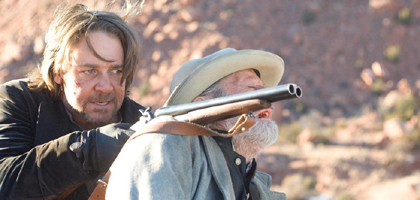Primary navigation

USA 2007

Reviewed by Geoffrey Macnab
Our synopses give away the plot in full, including surprise twists.
Arizona, late 19th century. Dan Evans is a small-time rancher struggling to keep afloat. There has been a bad drought and he is in debt. He has an injury to his leg sustained during the Civil War, the railway is coming through his land and he is under pressure to sell up. He is consumed with guilt over his failure to provide for his wife, Alice, and two young sons, Will and Mark. Legendary outlaw Ben Wade and his gang hold up the Butterfield stagecoach, witnessed by Dan and his sons. Wade steals their horses, but lets the trio live. Later in town, Wade is arrested. Pinkerton detectives and bounty hunters plan0 to take him across country to catch the 3.10 train to Yuma that will deliver him to prison. Evans agrees to accompany Wade to the train in return for a payment of $200 that he hopes will save his ranch.
Wade's gang learns about the plan to take their boss to the Yuma train. During a difficult journey across Apache territory, several of Wade's guards are killed. Evans is determined to get Wade onto the train, despite the mutual respect which has developed between them. His bravery redeems him in the eyes of his son, Will, who helps in the mission.
Against the odds, and with Wade's collusion, they reach the train. At the last moment, Wade's gang guns down Evans. Wade is freed, but turns his gun on his own gang members. He then allows Will to put him onto the train.
Periodically, the death of the Western is foretold. As a genre, it is sometimes considered too mired in moralistic machismo to survive and when Westerns are tackled by contemporary filmmakers, it is often with large degrees of irony and self-reflexivity. James Mangold's achievement is to fashion his remake of 3.10 to Yuma in a traditional, yet compelling way - there are no deliberate anachronisms or elaborate framing devices to gild the events depicted. Nor - despite all the talk of railroads, changing times and the footage of the rampaging Wade gang - is the film weighed down by its self-conscious sense of elegy. Mangold's 3.10 to Yuma is about the little man as hero - the rancher Dan Evans (Christian Bale) who is hired to put outlaw Ben Wade (Russell Crowe) on the train that will take him to captivity and execution. The screenplay does depart from Delmer Daves' 1957 original (which was based on an Elmore Leonard short story), but the changes it makes are more to expand the scope of the story than to distort it.
The dialogue sometimes errs on the sententious side (there are too many one-liners of the "Sometimes a man's got to be big enough to see how small he is" variety), but the cast manages to avoid sounding too arch. It helps, too, that Mangold has an actor as focused and intense as Christian Bale in the role of his everyman. Hollow-eyed and febrile, he brings the same edge to Dan Evans as to his insomniac in The Machinist or his POW in Rescue Dawn, but he also conveys the character's essential decency. There is something biblical about Dan's misfortunes - his leg injury, the drought that is destroying his smallholding, the creditors who demand repayment and the wife and sons who've almost lost faith in him. His heroism lies in the way he refuses to accept his plight.
The outlaw Ben Wade is his equal and opposite. As in Michael Mann's Heat, the protagonist and his foil on different sides of the law have more in common with each other than with their own kind. Each is bound by his own moral code and by the expectations among others that it fosters. They are fatalistic and aware that they are playing preconceived roles. "I wouldn't last five minutes leading an outfit like that if I wasn't rotten as hell," says Wade, explaining his obligation to be as mean as possible.
In the course of the long journey to catch the 3.10 the lines between good and evil are continually blurred. It is a generic convention that the rich railroad-building easterners buy their own justice. Here, the Pinkerton detectives and town marshals turn out to be venal. We learn that McElroy once took part in a massacre of Apache women and children. Only Dan Evans is untainted and unwavering in his commitment to the cause. We are always aware, though, that all he can do is buy time. The $200 earned will keep his ranch going for the new future, but in the long term, his way of life will be unsustainable.
It is always tempting to read contemporary Westerns as allegories with topical resonance, but here contemporary references are not obviously foregrounded. It is part of the richness of 3.10 to Yuma that this is a classical piece of storytelling with themes and characters that can be found in the very earliest Westerns. All the old archetypes and oppositions are here. What Mangold proves is that when they are tackled with passion and conviction, they seem as fresh as ever.